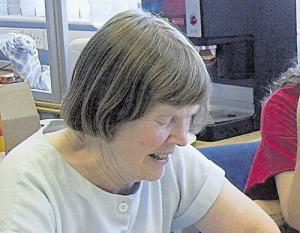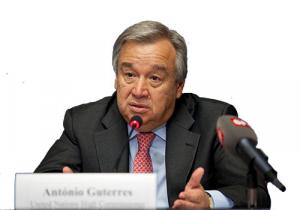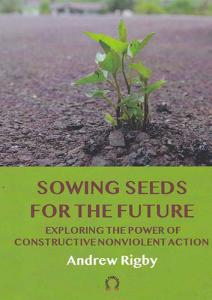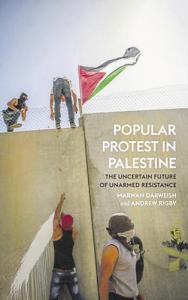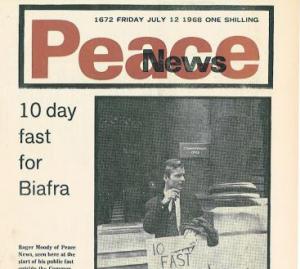April Carter’s father was an engineer with the British colonial service and April spent the first 10 years of her life in East Africa. Returning to the UK in 1947, April was enrolled at a public school in Gloucestershire, not far from the family home in Cheltenham. The staff at the school recognised April’s outstanding intellectual abilities and fast-streamed her through the English secondary school examination system – resulting in her being offered a place at Oxford university. Deciding…
Rigby, Andrew
Rigby, Andrew
Andrew Rigby
This article was written before the Ukrainian military began their counter-offensive in early September. The advances made have encouraged talk of ‘victory’ and the maximisation of Ukrainian war aims – even beyond the military defeat of Russia. The need for a negotiated end to the death and destruction becomes ever more urgent.
The Russian invasion of Ukraine was an illegal act of aggression and the war that has ensued is a disaster of death, destruction and displacement on a…
Peace News carries some of the responsibility for me spending much of the last two years writing a book about constructive nonviolent action.
I was quite young when I became convinced that killing people was wrong, and I began to take on the identity of a pacifist. Peace News was one of my main sources of insight into what pacifism entailed, leading me to an interest in anarchism as part of a search for nonviolent and non-coercive modes of action for change.
…
As one member of a popular committee in Silwan [on the outskirts of Jerusalem] observed: ‘A major challenge is the coordination of nonviolent activities. Some focus on the [Israeli Separation] Wall, others on checkpoints and others on settlements. There is no coordination like there was in the first intifada.’
Underpinning the different challenges organisers identified as obstacles was what many observed to be a pervasive lack of trust in leadership at any level, including…
Howard's sudden death has left us shocked and bereaved, and with an irrational sense of outrage that he has left us so unexpectedly. He was only 63 and in the middle of helping organise next summer’s WRI conference in South Africa. He leaves a gap which others must strive to fill. It will be difficult, and the following overview and appreciation of his life as a peace activist, organiser and researcher will give some indication of the scale of the challenge.
But before reviewing his…
The most common representation of peace emblems in Britain occurs on people's clothing and attire in the form of badges, ear-rings and the like, or in the guise of “bumper stickers” and other emblems attached to cars and bicycles - personal possessions emblazoned with such symbols as rainbows, doves, olive leaves, broken rifles and “smiling suns”.
These are mobile peace symbols, worn for display and as items of fashion, but they can also signify something about the general…
Utopia - no place, a never-never land beyond the realm of everyday experience, a dream world that is unattainable, a fantasy vision to which people might like to fly in their dreams and escape the chains of reality.
Utopian was the pejorative term also used by Marxs associate Freidrich Engels to dismiss the work of early nineteenth century socialists like Robert Owen and Charles Fourier, who were naïve enough to believe that you could create a world based on the values of…
Peace News had its origins in a pacifist study group convened by Humphrey Moore in Wood Green, London in 1936. Having completed their programme of studies they decided to engage in some form of practical action that would propagate the pacifist case to a wide audience. The publication of the first issue of Peace News on 6 June 1936 was the result, financed by donations from members of the study group and their friends.
The first issue had a print run of 5,000. Humphrey Moore was the…
During the 1948 war that resulted in the establishment of the state of Israel, some 750,000 Palestinians fled their homes and became refugees. Following the 1967 war in which Israel occupied the West Bank and the Gaza Strip many more Palestinians were displaced. There are now somewhere between four and six million - two thirds of the Palestinian people - living outside the borders of historic Palestine.
In many ways I think of my friend Hassan as a typical Palestinian refugee. His…
Steve Schofield is one of the foremost experts on demilitarisation and the conversion of military resources to civilian use. He is a kind of practical utopian, someone who has always used his specialist knowledge and rigorous analytical approach to inform his pursuit of a world without war.
In his latest book he takes a clear look at how the search for the twin goals of peace and prosperity - through the three pillars of federalism, international trade and comprehensive disarmament…
Published works relating to forgiveness generally fall into one of three categories. First off are the Christians who urge us all to follow God's example and forgive and embrace all those who have done us wrong. Then there are the therapeutic manuals produced by behavioural psychologists and new-age gurus that tell us how to achieve the mental and emotional fulfilment which is the fruit of forgiveness by a simple six or maybe twelve-stage process. Finally there are the philosophical works…
I had a Rwandan student who told me that during the genocide of 1994 husbands in cross-community marriages would kill their wives (and vice-versa). It is beyond imagining. This was not some bureaucratically organised, impersonal, rational process like the Holocaust of the Second World War. This was a genuinely popular genocide.
What most of us cannot understand is how it came about that hundreds of thousands of people who had never killed before took part in the mass slaughter. It is…
Over recent years, writings on gender in the Middle East have tended to focus on the status of women under Islam. The contributors to this volume, by contrast, explore the manner in which male identities are created and reproduced in different societies and settings within the Middle East.
What the contributors share is the basic assumption that masculinity is socially constructed, there is no fixed determinant of “male-ness”. What surprised me in reading some of the accounts of how…
More than twenty years ago Dennis Hardy wrote a great book on alternative communities in 19th century England which is now out of print. He has now written a “sequel”, a history of community experiments in England during the first half of the 20th century.
This new book bears some of the stylistic hallmarks of the earlier one: it is written with deep sympathy for the pioneers and their projects. The text is complemented by a host of photographs and other illustrations that help bring…
Genocide, according to the UN Convention of 1948, is defined as any acts committed with the intent to destroy in whole or in part a national, ethnic, racial or religious group. This book represents a review of the various dimensions of a strategy that might lead to a genocide-free world.
The key strands identified include 1) Strengthening the institutions and actors like the UN and NGOs that are dedicated to the monitoring and the protection of human rights - including the…


